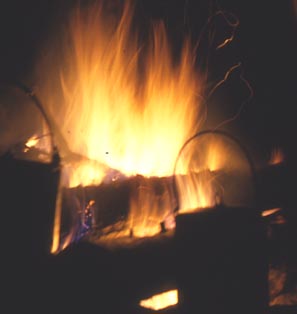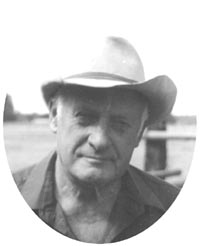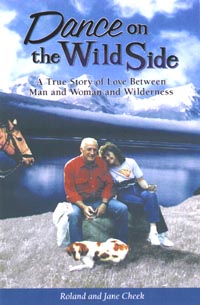a weblog sharing info on outdoor skills and campfire musing by a guy who spends a bunch of time in pursuit of both
CULTURE
WHERE -
TALES ARE TOLD OF
Welcome to Roland Cheek's Weblog
Roland is a gifted writer with a knack for clarifying reality. Looking forward to more of his wisdom
- Carl Hanner e-mail
When I say I believe in a Square Deal I do not mean, and nobody who speaks the truth can mean, that he believes it possible to give every man the best hand. If the cards do not come to any man, or if they do come and he had not got the power [skill] to play them, that is his affair. All I mean is that there shall not be any crookedness in the dealing.
[With today's growing class disparity, where's Teddy now when we really need him?]
To access Roland's weblog and column archives
Tip o' the Day
The retired forest ranger told of his experiences taking a group of boys out to work as volunteers on trail projects. "There's nothing wrong with today's kids," the man said. "They're just as good as kids ever were. Our problem is we've emplaced a system that won't let them work."
He's right. It's easy to recall how naysayers of my youth claimed kids of that day weren't worth the powder to blow 'em to hell. Isn't it ironic those same kids who were so reviled in my youth are (now that they are grandparents) so critical of kids today?
Like the retired ranger, I believe in today's kids. I believe most of them want to work; want to do a good job; want to be respected (and praised) for their performance. Their problem--what my contemporaries believe mirrors laziness and an unwillingness to work--is the same problem of youth of any age: they have trouble seeing work that needs to be done.
I hired young guides back in the days when I led guests to adventure in some of the ruggedest lands in all the northern Rockies. Without exception, those guides came to my outftt with a willingness to work and a driving desire to please. What they lacked was experience. How could they they possibly understand the importance of adjusting an off-kilter pack before it rubbed a sore on the horse's back without first soring a horse? How could they know to mantie everything possible the night before pulling out for hunting camp without experiencing the time gain on the following morning?
They couldn't unless they were told. Then they still had to be shown how to accomplish it. But Lord did they know how to work! They worked from daylight to dark, day in and day out. They worked for little money and few material rewards. They worked for the sheer joy of "being" part of adventure, "because" of a zest for the outdoors, and "for" a love of wildlife.
The second half of the old ranger's critique constitutes a definite problem: that we've emplaced a system keeping kids from doing the kinds of quality work they'd like to achieve. Three "ell" words preventing them are laws, liability, and litigation.
I once read a truth I believe to be especially appropriate for this thesis. I don't know its source and my delivery may lack polish, but here it is: "Generation after generation, the very young do the impossible because no one bothered to tell them it is impossible."
That's my final word on the youth of today, except for this: There are three requirements for top performance for all people: 1) work at something you want to do. 2) be praised occasionally for a job well done; 3) receive a living wage.
If you are an employer and wish to receive top performance from your workers, pays special attention to 2) and 3).
THE LONELIEST SOUND IN THE WORLD
It's my notion that the loneliest sound in all the world is the honking of a single goose flying in a fog. True, there's inspiration to be gleaned from the noisy gabbling of a high-flying, continent-spanning flock of Canadas winging their way on a blue-sky day. True, their honking sounds canned even though there's little rhythm to it--like a gaggle of excited schoolkids spilling from their bus at the beginning of summer vacation.
But separate a single goose from that flock and his lonely honking, though technically identical to those of individuals within the flock, takes on a mournful note not achieved by any other bird or mammal. Even the hollow mockery of a loon sounds positively upbeat alongside that of a single honker flying in a fog. The loon's crazed cackle, you see, ends in a statement, while the honking of a lone goose must be construed as ending in no other way than as a question; a question seemingly growing more frantic and frightened with each passing moment.
Other wildlife calls predicated to chill, inspire, or at least give one pause, is that of coyotes, wolves, mountain lions, and rutting bull elk.
The yipping of coyotes has been described as "querulous"--a description that has, I think, a modicum of merit. Sometimes. Even the brawniest dog coyote seems unsure of himself around bigger, uglier, or more savage animals. Sometimes, though, especially when they're yipping as part of a coyote choir, they come off as a mammalian rendition of a fiddlers jamboree. Whatever. But this I know: I've never been out in the big lonesome with another person who didn't pause to listen and think and feel when a far-off coyote besgins tuning up for choir practice.
Neither has there ever been a hunter whose adrenaline failed to gush when the ringing challenge from a rutting elk floated up from a distant basin. Still, the bull's is a challenge not even remotely akin to loneliness. He's telling the world that his harem is nearby and he's proud and his chest is filled with brute power, and by God nobody nor no thing better get in his way! Or he's telling the world that he's alone, lonely, and on the peck, pining because he has no harem and he's in the mood to take one away from any other bull who has one and thinks he's cock of the walk, and by all that's holy nobody better get in his way!
Wild sounds? What of the long drawn-out howls of a traveling wolf pack? I'm no expert on the big canine, but it seems to me the wolf is also making a statement; telling everything and everybody he's out there and that he intends to stay. He's admitting he might not be the biggest or toughest or meanest, but he's there! And collectively, if more than one, they're ending their statement by telling the world that given an even chance, they'll fear nothing and no one . . . ever!
That leaves the chilling cry of a mountain lion. Whatever his reason, no one experiencing that scream has ever described it as "lonesome." My one and only experience caused me to sit bolt upright in my sleeping bag in the midle of one of the blackest wilderness nights I've ever chanced to be chilled to the bone in. Lonely? You bet--I was darned lonely, even though there were four other sleeping bag slumberers nearby, two of which also sat bolt upright. (Incidentally, the two dogs we had with us--a hound and a Weimeraner--scurried into our shelter and tried to burrow beneath my bag.)
There are other wierd, possibly lonesome sounds sometimes heard in the big lonesome: the hooting of a great horned owl is one; so is the hollow knocking of a pileated woodpecker beating high up on a dead snag tree. But both these birds dote on being alone and only inexperienced neophytes would describe them as mournful.
Nope, it's the lone goose honking for his mates that's most heart-wrenching of all. It makes you want to light a lantern and set it in a meadow so the big bird could at least find a landing spot in which to rest before continuing on his lonesome way.
Roland Cheek wrote a syndicated outdoors column (Wild Trails and Tall Tales) for 21 years. The column was carried in 17 daily and weekly newspapers in two states. In addition, he scripted and broadcast a daily radio show (Trails to Outdoor Adventure) that aired on 75 stations from the Atlantic seaboard to the Pacific Ocean. He's also written upwards of 200 magazine articles and 12 fiction and nonfiction books. For more on Roland, visit:
www.rolandcheek.com
Recent Weblogs
Tuesday, May 27, 2008
for more info about these and other Roland Cheek books
There's a bunch of specific info about Roland's books, columns, archives and radio programs. By clicking on the button to the left, one can see Roland's synopsis of each book, read reviews, and even access the first chapter of each of his titles. With Roland's books, there's no reason to buy a "pig in a poke."
for detailed info about each of Roland's books
Read Reviews
Read their first chapters
For interested educators, this weblog is especially applicable for use in history classes, as well as for journalism students.
Roland, of course, visits schools. For more information on his program alternatives, go to:
NEXT WEEK:
FICKLENESS OF MOUNTAIN LAKES
www.campfireculture.com
Too honest to deny its roots in hunting, but too human to be contained by its limits, The Phantom Ghost of Harriet Lou is a book for those who care about wildlife of all kinds.
Check out Roland's office: sun roof, daylight basement, and no parking problems. Short takes, sage wit, large humor, all gleaned from a lifetime outdoors
Good grizzly mother? Or a savage killer. Your choice. An entire book about the life of a single charismatic grizzly bear
9 X 12 coffee table book about the best loved chunk of wild country in America: the place? Montana's Bob Marshall Wilderness . . . When? Then and now -- and always will be -- the way God made it.
source links for additional info
to send this weblog to a friend
to tell Roland what you think of his Campfire Culture weblog
to visit Roland's newspaper columns and weblog archives
- Theodore Roosevelt
To learn more of Roland's & Jane's exciting life as outfitters and guides in the Bob Marshall Wilderness, read Dance On the Wild Side
Learning To Talk Bear is Roland Cheek's best selling book -- now in it's 5th printing.
Safety in bear country? Of course! But this book also teaches the reader about the animals themselves.








